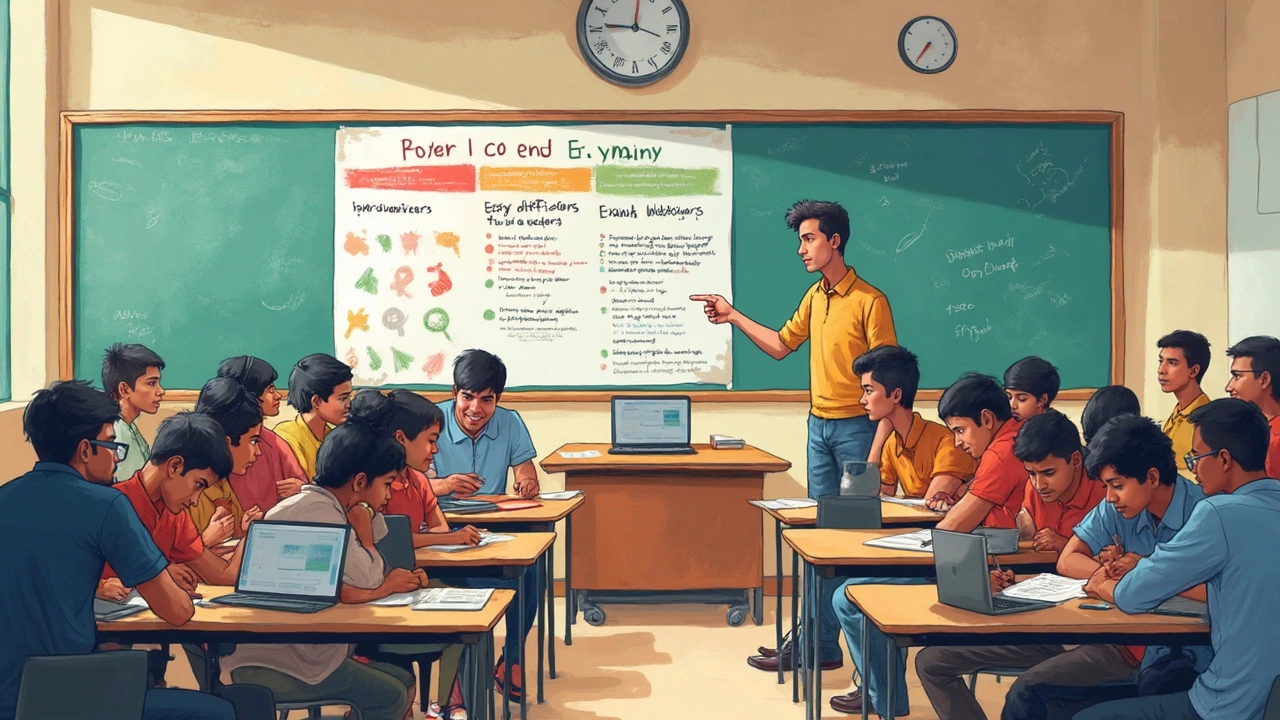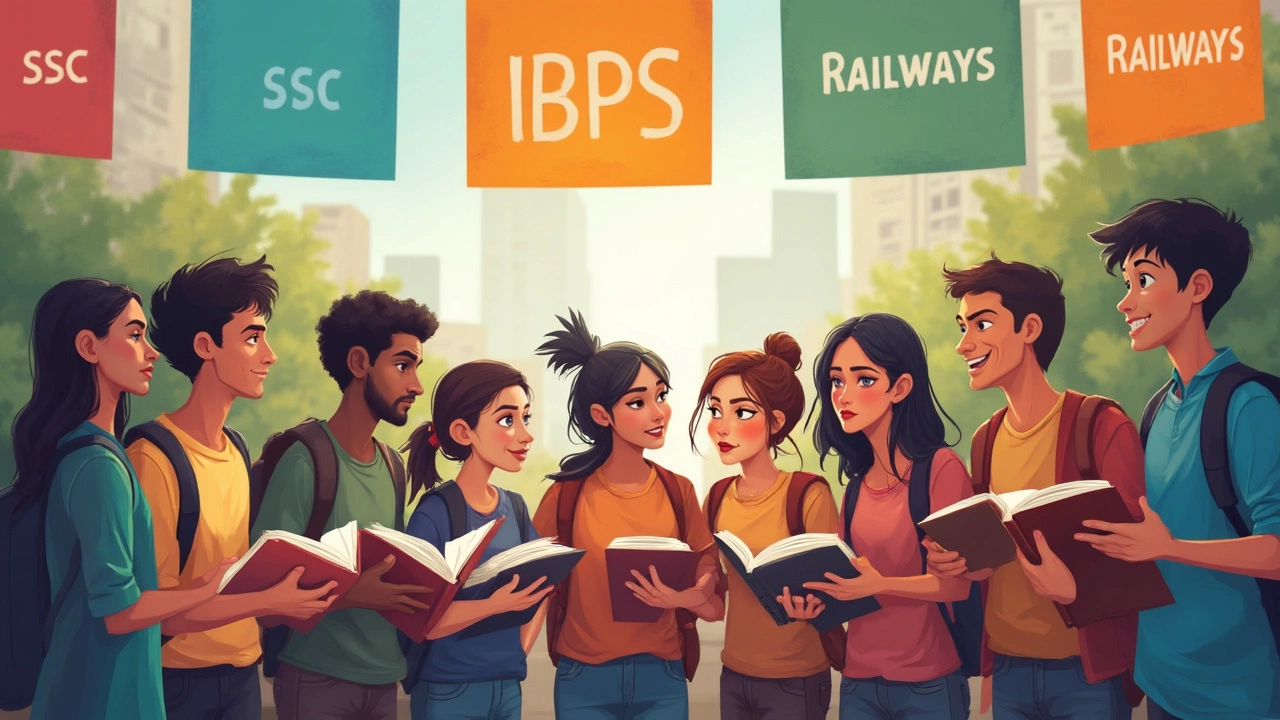People love to ask, “Which competitive exam is the easiest to crack?” The truth isn’t that simple. What looks easy for your friend might feel like climbing Everest for you. Still, you’re not alone if you want solid info—especially with new openings for government jobs and entrance tests in 2025.
If you’re just starting out, some exams have lower cutoffs and simple syllabi. For example, the SSC MTS (Multi Tasking Staff) or railway group D exams are usually less tricky than stuff like UPSC or IIT-JEE. They stick to basics—math, English, general awareness—nothing too wild or advanced.
But don’t underestimate any exam. Some have massive competition. So, cracking “easy” exams still takes strategy and hard work. By focusing on exams that match your strength and have a high selection ratio, you can boost your chances.
- What Makes an Exam 'Easy'?
- Popular Exams with a Lower Difficulty
- Surprising Factors That Help You Succeed
- Smart Tips to Make It Even Easier
- Final Thoughts: Picking an Exam That Fits
What Makes an Exam 'Easy'?
Not all exams are created equal. When people call something the easiest competitive exam, they usually mean a few key things: the syllabus isn’t that big, the questions stick to basics, and the cutoff scores aren’t sky-high. But there’s more going on behind the scenes.
Here’s what actually makes an exam feel easy:
- Small Syllabus: Entry-level government exams like SSC MTS or Railway Group D usually cover basic math, simple English, and general awareness. You won’t find super tricky topics or deep technical stuff like in banking or engineering exams.
- Question Type: Exams with lots of direct or one-liner questions (not case studies or complex reasoning) are less time-consuming and mentally draining. Multiple-choice questions add to the ease—one out of four, not open-ended essays.
- Competition Level: If there are more seats and fewer heavy-duty experts applying, your chances go up. Exams with larger vacancies and a higher selection ratio—like SSC GD Constable—are often thought of as easier.
- Repeating Questions: Some tests repeat questions or follow set patterns most years. Knowing this lets you prep better with previous years’ papers. Practice pays off more with these exams.
- No Deep Interview Rounds: Exams without tough interview or group discussion rounds save you a lot of stress and make it more predictable.
Just for some perspective—here’s how a few popular exams stack up on these points:
| Exam | Syllabus Size | Question Type | Selection Ratio | Post-Exam Rounds |
|---|---|---|---|---|
| SSC MTS | Small | Direct MCQs | Higher | None |
| UPSC CSE | Huge | Mixed (Tough MCQs, Essays) | Very Low | Interview |
| Railway Group D | Small | MCQs, Basics | High | Short Physical Test |
Bottom line—"easy" depends on your own strength but the signs are clear: small syllabus, simple questions, generous seats, and less-interview hassle. Always size up the exam before you sign up. That’s step one to picking the easiest competitive exam for you.
Popular Exams with a Lower Difficulty
Not all competitive exams are monsters. If you're eyeing that first government job or a simpler way into the sector, a few exams are known for their lower difficulty. Here's the real deal—these aren't "walk in the park" easy, but they do have less tough questions and a friendly syllabus.
- SSC MTS (Multi-Tasking Staff): The questions stick to basic English, general knowledge, and simple math. Often, even class 10th knowledge covers most of the questions. The cut-off scores are reasonable, and you don’t have to remember complicated theories.
- RRB Group D: If you’re aiming for railways, this group D exam is popular for a reason. The questions focus on general science, reasoning, and elementary math. You don’t see negative marking as much as in tougher exams. The number of applicants is huge, but so are the available seats.
- SSC GD Constable: The paper covers basically the same areas as SSC MTS: simple arithmetic, GK, English, and reasoning. No heavy syllabus, and lots of vacancies are announced every time. You just need to be consistent with practice.
- IBPS Clerk (Prelims): While banking sounds scary to some people, the prelims stage for clerk jobs is way simpler than PO or SO levels. It's mostly about speed in easy math, logic, and English basics. Prelims is the hurdle you want to cross first—and it’s the gentlest step in the banking field.
| Exam | Eligibility | Typical Vacancies (2024) | Key Subjects |
|---|---|---|---|
| SSC MTS | 10th Pass | ~12,000 | Math, English, GK |
| RRB Group D | 10th Pass | ~1,00,000 | Math, Science, Reasoning |
| SSC GD Constable | 10th Pass | ~50,000 | Math, Reasoning, English, GK |
| IBPS Clerk | Graduate | ~8,000 | English, Math, Reasoning |
Why are these called easier? The topics rarely go beyond what you learned up to 10th or 12th grade. Plus, competition is balanced by the massive number of seats on offer each year. If you're serious about cracking an easy government exam, these options deserve a serious look. Just keep in mind, the earlier you start practice, the better your shot at that offer letter.

Surprising Factors That Help You Succeed
Cracking the easiest competitive exam isn’t always about how smart you are. Some small and unexpected things can tip the scale in your favor and make a bigger difference than you think.
One major factor? Timing. If you get serious about your prep when most people are still procrastinating, you’ll zoom ahead. Most candidates for easy government exams start prepping only after official notifications drop, but the winners are usually those who started a couple of months earlier. A survey by Adda247 in 2023 found that 60% of candidates who cleared beginner-level government exams started practicing previous-year papers at least 90 days before the exam.
Familiarity with the exam pattern is another hidden advantage. Many folks just skim the syllabus, but the ones who dig into the pattern, weightage of topics, and which sections show up most, spot shortcuts nobody else sees. For example, the General Awareness part in SSC MTS is mostly current events from the last 6-8 months. Knowing this means you can skip old news and focus on what matters now.
Here are some factors that can really boost your odds:
- Using Mock Tests Early – People who take mock tests weekly, even before they finish the whole syllabus, learn to handle pressure and spot time-wasting traps.
- Prioritizing High-Scoring Sections – In exams like Railway Group D, math and reasoning often carry more weight. Scoring well here boosts total marks quickly.
- Consistent Revision – Spending 15 minutes at the end of each study session revising old topics helps you remember more for longer. It beats long cramming sessions.
- Peer Groups – Being in a study group or even an online forum can double your motivation and bring in new tricks you’d miss studying alone.
- Smart Resource Choice – Plenty settle for free notes online, but using proper, up-to-date books or video series makes a real difference, especially for current affairs and English.
And here’s a useful stat:
| Habit | % of Successful Candidates |
|---|---|
| Weekly mock tests | 72% |
| Group discussions | 57% |
| Daily revision | 65% |
At the end of the day, you don’t need genius-level IQ for the easiest competitive exams. It’s about steady effort and making some smart moves that others skip.
Smart Tips to Make It Even Easier
If you’re aiming for the easiest competitive exam and want to give yourself an advantage, skip blindly following others’ routines. Here’s how you can get a real shot at cracking these entry-level government exams without losing your mind:
- Stick to the Official Syllabus: Download and print the latest syllabus from the official website. Don’t waste time on extra topics—it’s rare for basic exams like SSC MTS or Railway Group D to go off-track.
- Master Previous Years’ Papers: Going through old question papers is like cheating without breaking the rules. You’ll see repeating questions, question types, and difficulty levels. In past years, almost 30% of questions in SSC MTS have been repeated in some way or the other.
- Set Micro Goals: Instead of vague plans like “study math,” break it down: “Finish 20 profit and loss questions by 7 pm.” Micro goals give you that dopamine rush when you tick them off, and things actually get done.
- Mock Tests Matter: Once you’re steady on the basics, take at least one mock test every week. Stick to real time-limits. Data shows candidates who take regular mock tests improve their scores by around 15-20% compared to ones who skip this step.
- Revise Smart: Revision isn’t glamorous, but it’s where most toppers win. Every Sunday, review weak topics. Make flashcards—or even your own silly mnemonic tricks, as long as they work for you.
Check out this table showing the impact of these strategies—this info is from a 2024 survey done with first-time SSC MTS qualifiers:
| Strategy | Percentage Reporting Improvement |
|---|---|
| Sticking to official syllabus | 68% |
| Practicing previous papers | 59% |
| Regular mock tests | 44% |
| Smart revision | 38% |
Don’t just study hard, study smart. And whatever you do, remember—consistency beats last-minute cramming every time in these easy government exams.

Final Thoughts: Picking an Exam That Fits
Don’t get stuck on finding the absolute easiest competitive exam—instead, figure out which one fits you best. If you’re strong in math and quick thinking, SSC MTS or banking assistant exams might actually feel easier than expected. On the other hand, if you’re better with words or current issues, try State-level clerical or postal assistant exams.
Here’s a quick comparison of some popular entry-level options:
| Exam Name | Sections Covered | Selection Ratio* |
|---|---|---|
| SSC MTS | Maths, English, GK | Approx. 1:18 |
| Railway Group D | Maths, Reasoning, GK | Approx. 1:13 |
| State Postal Assistant | English, Maths, GK | Approx. 1:20 |
*Selection ratios are estimates based on recent years. Actual numbers vary.
If you don’t like heavy competition, look for exams with more vacancies and less publicity—sometimes state-level or technical board recruitments slip under the radar and have fewer applicants.
- Choose exams matching your strengths, not just reputation.
- Study the exam pattern and previous year cutoffs before you start preparation.
- Talk to someone who’s recently cleared the exam—that’s the fastest way to get the truth on difficulty and typical questions.
Tackle mock tests honestly to see where you stand. If a paper feels smooth and the topics match your comfort zone, go for it. If it feels like torture, move on to the next option. It’s better to aim for a crack exam that matches your vibe than chase the "easiest" and still struggle.
